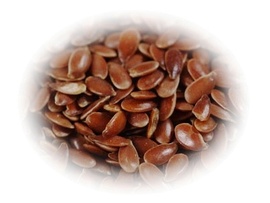|
While, intake of flaxseed is claimed to be effective in promoting hair growth, application of flaxseed oil is also said to work wonders for hair health. Studies show that hair loss due to hormonal imbalances in women can be remedied with flaxseed. Variations in the estrogen levels may lead to shrinking of hair follicles, thereby causing hair loss and hair thinning. The phytoestrogens in flaxseed may normalize the hormone levels, thereby arresting hair loss and boosting hair growth. Studies show that the omega 3 fatty acids in flaxseed may prove beneficial for treating scalp conditions, like, psoriasis, eczema, etc. Consumption of flaxseed may help to prevent dandruff caused by these scalp conditions. So, hair loss caused by the above said scalp conditions can also be reduced with flaxseed use. Even flaxseed oil and hair growth are linked. Application of this oil (otherwise known as linseed oil) is found to be beneficial for hair in different ways. Flaxseed oil capsules are also taken orally. Low omega fatty acid levels may cause hair dryness, which leads to brittle hair that can suffer damage easily. Application of flaxseed oil helps in combating hair dryness, thereby reducing the rate of hair damage and promoting hair growth. Due to these benefits, flaxseed oil is added to various hair styling products, like, hair setting lotions. The foam-like gel produced by boiling flaxseed in water is used for hair setting. In general, flaxseed intake is found to improve the strength and sheen of the hair, along with the skin and nails.
Like any other food, eating excessive amounts of flax seeds can be harmful to your health. Raw flax seeds naturally contain cyanogenic glycosides-such as linamarin, linustatin, and neolinustatin. These cyanogenic glycosides can release cyanates that can be combined with sulfur molecules in our body to form thiocyanates. Excessive amounts of thiocyanates can sometimes be a problematic for our thyroid function and, for this reason, flax seeds are considered goitrogenic. These cyanogenic glycosides are not exclusive to flaxseed and are found in brassica vegetables and cassava, with many of the health concerns regarding cyanogenic glycosides stemming from studies showing that cassava was toxic to animals and humans (McMahon and others 1995). Cassava contains significantly more cyanogenic glycosides than flaxseed.
In addition to cyanogenic glycosides, trypsin inhibitor, linatine, and phytic acid are other antinutrients contained in flaxseed. Trypsin inhibitor activity (TIA) in flaxseed is lower than those in soybean and canola seeds. Other anti-nutritional compound present in flax seeds is linatine, an antipyridoxine factor. Although linatine is a problem in chicks, flaxseed has not been associated with a vitamin B6 deficiency in humans. In fact, no effect on serum pyridoxine levels in subjects consuming 45 grams of flaxseed per day over 5 wk has been observed (Dieken 1992). These data suggests that linatine is not of a concern as long as we eat less than 45 g of flax seeds a day. How much is too much flax seeds? Iowa State University News Release
March 24, 2010 AMES, Iowa — A new study from Iowa State University’s Nutrition and Wellness Research Center (NWRC) may give men a way to combat high cholesterol without drugs — if they don’t mind sprinkling some flaxseed into their daily diet. Suzanne Hendrich, an ISU professor in food science and human nutrition, led a study that examined the effects of flaxseed lignan in 90 people diagnosed with high cholesterol. The results showed that consuming at least 150 milligrams of flaxseed lignans per day (about three tablespoons) decreased cholesterol in men, but not women, by just under 10 percent over the three months that they were given the flaxseed. How flaxseeds help your health?
Flax seed promote cardiovascular health: Omega-3 fatty acids present in flax seed will lower LDL (bad) cholesterol levels. Flax seed promote colon health: Fiber in the flax seed works excellent for people suffering from constipation. Flax seed can boost immunity: Eating flax seeds will improve your resistance to diseases and promotes good health. Flax seed provides oil for brain development: Flax seed have anti-inflammatory benefits: Omega-3 fats in flax seed can help reduce the inflammation that is a significant factor in conditions such as asthma, osteoarthritis, rheumatoid arthritis, migraine headaches, and osteoporosis. Flax seed help fight breast cancer: Flaxseed plays a role in the prevention and treatment of breast cancer and that the lignans may in part be responsible for its effect. The nature of the effect depends on the stage of the cancer process at which flax seed are introduced in the diet. Flax seed works as a natural weight loss product: Flax seed are rich in oil, a high energy nutrient. Eating flaxseed give you “satisfied” feeling. The feeling that you get when you have completed a meal. Nutritionists term this as satiety – the feeling of fullness. Foods with minimal nutritive value leave you still craving food. Eating flax seed will reduce your overall daily food intake and assist you with weight management. Meta-analysis of the effects of flaxseed interventions on blood lipids
American Journal of Clinical Nutrition 90: 288-297, 2009 Objective: We aimed to identify and quantify the effectiveness of flaxseed and its derivatives on blood lipid profiles. Design: A comprehensive literature search was performed on the basis of English reports of randomized controlled trials offlaxseed or its derivatives on lipid profiles in adults, which were published from January 1990 to October 2008. Attempts also were made to access unpublished data. Study quality was assessed by using the Jadad score, and a meta-analysis was conducted. Results: Twenty-eight studies were included. Flaxseed interventions reduced total and LDL cholesterol by 0.10 mmol/L (95% CI: –0.20, 0.00 mmol/L) and 0.08 mmol/L (95% CI: –0.16, 0.00 mmol/L), respectively; significant reductions were observed with whole flaxseed (–0.21 and –0.16 mmol/L, respectively) and lignan (–0.28 and –0.16 mmol/L, respectively) supplements but not with flaxseed oil. The cholesterol-lowering effects were more apparent in females (particularly postmenopausal women), individuals with high initial cholesterol concentrations, and studies with higher Jadad scores. No significant changes were found in the concentrations of HDL cholesterol and triglycerides. Conclusions: Flaxseed significantly reduced circulating total and LDL-cholesterol concentrations, but the changes were dependent on the type of intervention, sex, and initial lipid profiles of the subjects. Further studies are needed to determine the efficiency of flaxseed on lipid profiles in men and premenopausal women and to explore its potential benefits on other cardiometabolic risk factors and prevention of cardiovascular disease. Yes, flax seed works excellent for people suffering from constipation. The fiber in flaxseed binds with water, swelling to form a gel which, like other forms of fiber, helps soften the stool and move it along in the intestines. Only flax seed helps not the flax seed oil. Flax seed can also help with chronic constipation in irritable bowel disease. Germany’s Commission E authorizes the use of flax seed for various digestive problems, such as chronic constipation, irritable bowel syndrome, diverticulitis, and general stomach discomfort.
What are Lignans?
Lignans are naturally occurring compounds found in plants. Lignans are one of the major classes of phytoestrogens. When part of our diet, bacteria in our intestines (colon) convert the naturally occurring dietary phytoestrogens into mammalian lignans known as enterodiol and enterolactone (Figure 1; Wang, 2002; J Chromatogr B Analyt Technol Biomed Life Sci. 2002 Sep 25;777(1-2):289-309). Flax seed help fight breast cancer FLAXSEED, LIGNANS AND BREAST CANCER: AN UPDATE
Published in the Proceedings of the US Flax Institute Symposium, 2004 Compiled by Dr. Jim Hammond, Department of Plant Sciences, North Dakota State University Authors: Lilian U. Thompson, Jim Chen, Kah Poh Tan, Jennifer Brooks, John Hilditch and Paul Goss, Dept. of Nutritional Sciences, Faculty of Medicine, University of Toronto, Sunnybrook Health Science Centre and Princess Margaret Hospital, Toronto, Ontario Introduction The major plant lignans include secoisolariciresinol diglucoside (SDG) and matairesinol. The bacterial flora in the colon metabolizes SDG to enterodiol (ED) and enterolactone (EL), which are referred to as mammalian lignans. Because mammalian lignans have chemical structural similarity to the natural estrogen, 17-Beta-estradiol, they are thought to have weak estrogenic or antiestrogenic properties and, therefore, have protective effect against hormone-related diseases such as breast cancer. The richest source of mammalian lignan precursors is flaxseed, with levels greater than 100 times that in other oilseeds, cereal grains, vegetables and fruits (1). Hence we hypothesized that flaxseed has a protective effect against breast cancer in part due to its lignans. For more than a decade, we have been conducting research on the effect of flaxseed and its lignans on the different stages of breast cancer -- i.e. initiation, promotion, progression and metastasis. We also have been studying the effect of early life exposure to flaxseed and lignans on breast cancer risk. Many of the results have previously been reviewed (2-4). This paper provides an overview of our recent research findings. |
Categories
All
|
© COPYRIGHT 2023 NutraPro International
Logan, Utah, USA
Logan, Utah, USA



 RSS Feed
RSS Feed